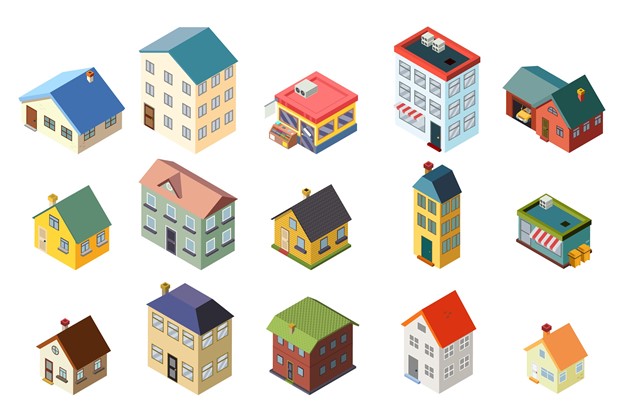Buying a home is without a doubt one of the biggest purchases you will ever make. When it comes to picking the perfect home for you and your family, there are many things to consider. From finding the perfect neighborhood to determining a price you can afford, it is important to consider all the possibilities. One of the biggest factors when choosing a house is the type of home that suits your lifestyle best.
There are several different building types to take into consideration. From single-family detached homes to condominiums, each property has unique characteristics to reflect on. Privacy, price, maintenance, and freedom are just a few of the things to take into account when choosing a home for your family. The list below displays the pros and cons of the different types of homes below.
Single-Family Home
A single-family home is one of the most popular types of homes in Canada, however, they are typically found outside of urban city centers. The reason for that is the space that comes along with these types of properties. These homes are completely detached from any other structure and lay on a piece of land that is owned by you.
Pros
- You own the home and land
- Fully customizable to your liking
- Offers the highest level of privacy
- Typically more spacious on both the inside and outside
- Full, exclusive front and back yard
- Often has outdoor storage (garage, shed)
- Resell value tends to hold stronger
Cons
- On average, the most expensive type of home to buy
- Fully responsible for the costs of maintenance and repairs
- Responsible for all of the upkeep inside and outside of the home
Multi-Family Home
This type of property tends to be less common than single-family dwellings. Multi-family residential homes are single detached buildings that can house anywhere from 2-4 families. Each family will have their own living space complete with a kitchen, bathroom, bedrooms, and typically a separate entrance. These types of buildings include duplexes (2 units), triplexes (3 units), and four-plexes (4 units). Properties that have more than 4 units are typically classed as commercial real estate in the eyes of a mortgage lender, therefore have unique buyer qualifications and can be more difficult to attain.
Pros
- Own land, building, and the units
- Freedom to renovate and customize your property as an owner and control the customizations made by tenants
- Live in a unit and rent remaining units, or rent them all out
- Ideal for multi-generational families who would like to live close by
- Rental income / investment property
- Tax benefits
Cons
- Less privacy, sharing at least one wall with another unit
- Fully responsible for maintenance and repair costs
- Responsible for managing tenants if renting units out
- The initial purchase price can be more expensive than single-family homes
Townhouse
A townhouse is a building that has another home attached to it on either one or both sides, each having a private entrance and yard space. These types of homes are often built narrow and tall, with multiple levels that give owners vertical space as opposed to horizontal space. They tend to be more common in densely populated areas.
Pros
- Commonly more affordable than single-family homes
- Private entrance
- Own the home and the land
- Less outdoor maintenance thanks to smaller yards
- Sometimes the townhouse community can have additional amenities for residents such as parks, pools, etc.
Cons
- Less privacy, share at least one, more commonly two walls with adjacent properties
- Land tends to be smaller
- Some townhouse communities have a homeowners association that can have strict restrictions about the exterior and appearance of your home and may come with additional costs
- Multi-level homes can be difficult for older homeowners or cause accessibility issues for others
Apartment
An apartment, although not available for ownership, is an important type of home option to consider. An apartment is commonly a large-scale multi-family building that has numerous units within one structure. Buildings can range in size and unit capacity, for example, an apartment building can have 10 units or 500 units. Each unit is capable of holding a separate family.
Pros
- Not responsible for any repair or maintenance costs
- Good for people who do not want to commit to the responsibility of owning a home or is currently unable to
- Can sometimes have included amenities such as a swimming pool, gym, sauna, etc.
- Can include increased security measures (doormen, keycards, etc)
Cons
- Not for purchase, only renting so you have no equity in the home
- Low privacy sharing common space with all residents and sharing walls with at least one other unit
- Little to no freedom to paint, renovate or make other custom changes
Condominium
A condominium is comparable to an apartment in terms of structure and layout, however, instead of renting, tenants purchase and own their unit. This is commonly a cheaper alternative to the popular single-family home and can often be found in the downtown city center locations.
Pros
- Far less maintenance than homes
- No outdoor maintenance for tenants
- Often has shared amenities such as swimming pools, saunas, gyms, etc.
- Limited responsibility for general building upkeep (share the costs with other owners)
- Can have increased security measures for safety
Cons
- Still responsible for maintenance and repairs within your unit
- Monthly condo fees for maintenance of indoor/outdoor common areas
- Can sometimes be restrictions revolving around renovations, remodels, and sometimes even pets
Co-operative
Cooperative, also known as co-op housing is a unique and non-traditional way to go about obtaining a residence. These buildings often come in the layout of multi-family homes, townhouses, or apartment buildings. With co-operative housing, you do not actually own any real property or the home, you own a share of the company that owns the property. Your share gives you access to one of the units in the co-op and also gives you the ability to vote and participate in the decision-making processes with other residents. Depending on the size of the co-op, there is either an elected board of directors or all members sit on the board to discuss management, budget, and other issues.
Pros
- Can be cheaper than an apartment or condominium
- Members pool resources together and operate on an at-cost basis
- Strong sense of community
Cons
- Hard to get into, often waiting lists and long interview processes
- Very social and interactive living structure, minimal privacy
- Monthly fee for maintenance (can be higher or lower than condo fees)
- More difficult to get a loan for a co-op
- No equity
Are You Looking To Buy A House in The Niagara Region? Call Davids & DeLaat!
If you have been thinking about purchasing a home in the Niagara Region, the team at Davids & DeLaat can help! We are experts in the local real estate market and we can help you determine and find the home that best fits your needs, from single-family homes to condos! Take a look at the available MLS listings in the Niagara Region and contact our team of real estate professionals today to start your home-buying journey!




